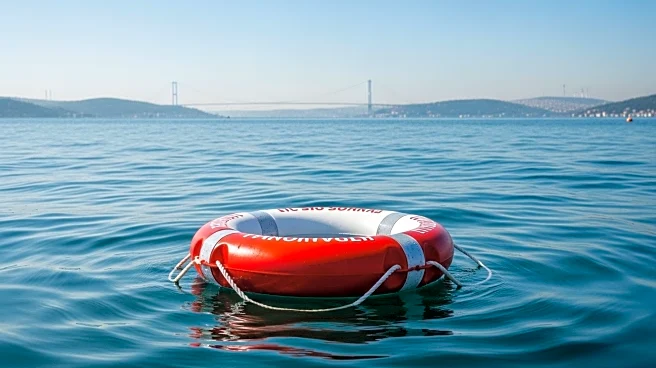What is the story about?
What's Happening?
Turkish authorities are conducting a search operation for a Russian swimmer, Nikolai Svechnikov, who went missing during the annual cross-Bosphorus race. The event, which took place on Sunday, involved over 2,800 swimmers from 81 countries competing in a 6.5-kilometer race from Istanbul's Asian shore to the European side. The race is known for its challenging conditions, including strong currents and choppy waves. Despite the presence of 100 monitoring vessels, Svechnikov failed to complete the race, prompting a search by the Turkish coast guard and maritime police. The Turkish National Olympic Committee, which organizes the event, expressed deep sadness over the incident.
Why It's Important?
The disappearance of a participant in such a high-profile international event raises concerns about the safety measures in place for open-water races. The Bosphorus race is considered one of the world's leading open-water competitions, attracting swimmers globally. This incident could lead to increased scrutiny and potential changes in safety protocols to prevent future occurrences. It also highlights the inherent risks associated with open-water swimming, which can impact the sport's perception and participation rates. The outcome of the search and any subsequent investigations could influence how similar events are organized worldwide.
What's Next?
The search for Nikolai Svechnikov is ongoing, with Turkish authorities utilizing various emergency services to locate the missing swimmer. The incident may prompt a review of safety measures by the Turkish National Olympic Committee and other organizations involved in organizing open-water races. There could be calls for enhanced safety protocols, such as increased monitoring and stricter participant qualifications. The international swimming community will likely follow the developments closely, as the findings could impact future race regulations and safety standards.
Beyond the Headlines
This incident underscores the broader challenges of ensuring safety in open-water sports, which are often subject to unpredictable environmental conditions. It may lead to discussions about the ethical responsibilities of event organizers in safeguarding participants. Additionally, the event's international nature highlights the need for cross-border cooperation in emergency response and safety standardization in sports.
















